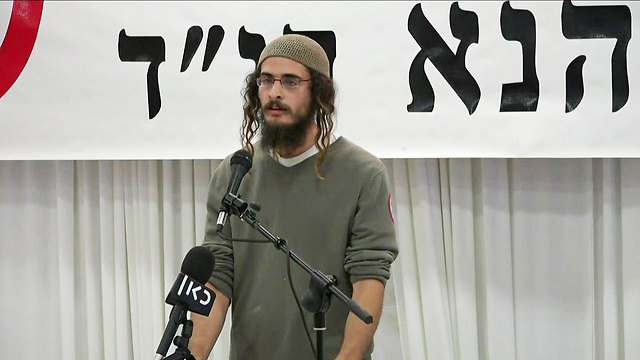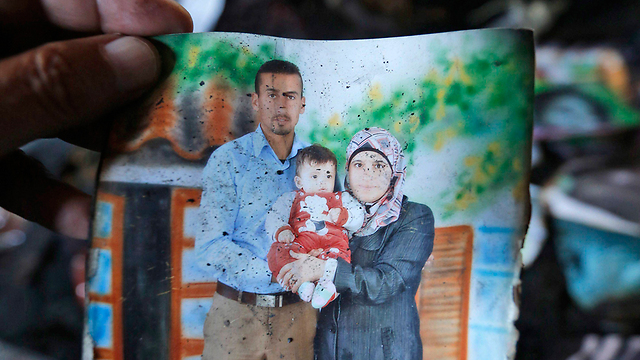La nuova era del terrorismo ebraico di Aviad Mendelboim e
Sintesi personale
Durante l'udienza della settimana scorsa sull'omicidio della Duma , un gruppo di dimostranti sostenitori dei due imputati aspettava fuori dall'aula con striscioni che riportavano :"la gente è con noi "
È chiaro che una manciata di elementi marginali che perpetrano o sostengono il terrorismo ebraico sono un'eccezione alla regola, ma è chiaro, come sosteneva tale bandiera, che la tolleranza per le opinioni radicali nell'opinione pubblica israeliana sta crescendo. Il sostegno che gli imputati nel caso della Duma ricevono illustra la spaccatura nella società israeliana tra coloro che credono che "il terrorismo sia terrorismo" indipendentemente dall'identità dei perpetratori e coloro che considerano il terrorismo ebraico come atti legittimi di vendetta in risposta a atti violenti di palestinesi in un conflitto a lungo termine.

Durante l'udienza della settimana scorsa sull'omicidio della Duma , un gruppo di dimostranti sostenitori dei due imputati aspettava fuori dall'aula con striscioni che riportavano :"la gente è con noi "
È chiaro che una manciata di elementi marginali che perpetrano o sostengono il terrorismo ebraico sono un'eccezione alla regola, ma è chiaro, come sosteneva tale bandiera, che la tolleranza per le opinioni radicali nell'opinione pubblica israeliana sta crescendo. Il sostegno che gli imputati nel caso della Duma ricevono illustra la spaccatura nella società israeliana tra coloro che credono che "il terrorismo sia terrorismo" indipendentemente dall'identità dei perpetratori e coloro che considerano il terrorismo ebraico come atti legittimi di vendetta in risposta a atti violenti di palestinesi in un conflitto a lungo termine.

Meir Ettinger (Foto: Gal Arbel)
La violenza attribuita al terrorismo ebraico dai primi anni '80 a metà degli anni '90 è stata caratterizzata da rappresaglie per atti terroristici palestinesi o per l'evacuazione di insediamenti in Cisgiordania. Il modello del terrore ebraico non è cambiato da allora, ma i loro motivi politici lo sono . La loro ideologia è diventata più estrema e si è avvolta di una coperta anarchica anti-sionista. A differenza del passato il terrore ebraico non è più guidato da motivazioni utilitaristiche come il dissuadere il governo dall'evacuare gli insediamenti, ma piuttosto dal desiderio di minare la stabilità dello stato, il che si tradurrebbe in un colpo di Stato e nella creazione di uno stato governato da Halacha (legge ebraica). Questa ideologia è riuscita ad ottenere un punto d'appoggio tra i giovani noti come attivisti del "cartellino del prezzo" o "Hilltop Youth" e ha visto l'ascesa di organizzazioni come "Giv'onim" e "Bat Ayin Underground". Il gruppo più estremo emerso come parte del nuovo terrorismo ebraico è l'organizzazione di Kvutzat Ha'mered (il gruppo ribelle), i cui membri hanno tenuto lo stendardo a sostegno degli imputati durante il processo Duma. L'organizzazione è stata fondata alla fine del 2013 e sostiene la violenza contro i palestinesi al fine di istigare una guerra religiosa.
Membri della famiglia Dawabsheh uccisi nell'attacco alla Duma (Foto: EPA)
La guerra, quando scoppierà, li aiuterà a rovesciare il governo al potere che percepiscono come morbido verso gli arabi. L'organizzazione, composta da poche dozzine di attivisti, si identifica principalmente con l'autore della "Rivolta", nipote di Meir Ettinger-Rabbi Meir Kahane, che è nella lista ebraica più ricercata dello Shin Bet. L'organizzazione si ispira alle lettere di Ettinger e dei rabbini che si identificano con questo fenomeno. Ad esempio, il libretto "Baruch the Man", documento fondatore per Hilltop Youth, elogia Baruch Goldstein, che ha commesso il massacro verso i palestinesi nel 1994. Questo opuscolo è stato scritto dal rabbino Yitzchak Ginsburgh, il cui libro The Order of Hour afferma che la sinistra israeliana è responsabile dell'omicidio di dozzine di ebrei e che "gli arabi non hanno il diritto di esistere nella terra di Israele". Un altro libro fondamentale è Torat Hamelech, scritto dai rabbini Yitzhak Shapira e Yosef Elitzur, in cui affermano che l'uccisione di non ebrei dovrebbe essere consentita. Qualsiasi persona ragionevole capisce che gli elementi marginali che compiono atti terroristici dovrebbero essere condannati e denunciati, come quelli che li sostengono e li incoraggiano. È lecito ritenere che sia difficile per il pubblico generale vedere gli ebrei, i loro fratelli, come assassini. Come possono questi ebrei essere definiti assassini durante un conflitto dove ci sono vittime civili da entrambe le parti? Il terrorismo, essendo una strategia scelta di solito dal lato più debole in un conflitto asimmetrico, pone naturalmente un dilemma morale per il lato più forte, specialmente nei paesi democratici. Pertanto, questa domanda è solo una delle tante che coinvolgono la società israeliana nella sua lotta contro il terrorismo su vari fronti e la maggior parte di essi si riduce alla questione fondamentale riguardante l'identità dello stato. Il pubblico israeliano deve chiedersi se vuole essere il tipo di società che si rallegra per le tragedie dei suoi nemici o se saremo una bussola morale per le regole di condotta universali, sia per noi stessi che per i nostri nemici?Op-ed: There is a growing acceptance and support of extreme right-wing views demonstrated by support for the defendants in the Duma terror trials. The practical objectives of Jewish rebel groups have turned into attempts to overthrow the government and start religious wars in order to establish a state governed by radical Jewish Law.During last week’s court hearing of the Duma murder affair—the "flagship case" in the authorities' struggle to eradicate Jewish terrorism, a group of demonstrators who came to support the two defendants waited outside the courtroom with banners that read "the people are with you."
It is clear that a handful of fringe elements who either perpetrate or support Jewish terrorism are an exception to the rule, but it is clear, as that banner claimed, that the tolerance for radical views in the Israeli public is growing. The support the defendants in the Duma case receive illustrates the rift in the Israeli society between those who believe that “terrorism is terrorism” regardless of the identity of the perpetrators, and those who view Jewish terrorism as legitimate acts of revenge in response to violent acts of Palestinian in a long term conflict.
The violence attributed to Jewish terror from the early 1980s to the mid-1990s was characterized by retaliation to Palestinian terror acts or the evacuation of settlements in the West Bank. The pattern of Jewish terror has not changed since then, but their political motives have. Their ideology has become more extreme and it has wrapped itself in an anti-Zionist anarchist blanket. Unlike in the past, Jewish terror is no longer guided by utilitarian motives such as deterring the government from evacuating settlements, but rather by a desire to undermine the stability of the state, which would result in a government coup and the establishment of a state governed by the Halacha (Jewish law). This ideology has managed to gain a foothold among the young people known as the "price tag" activists or “Hilltop Youth” and has seen the rise of organizations such as "Giv'onim" and "Bat Ayin Underground". The most extreme group that emerged as part of the new Jewish terror is Kvutzat Ha'mered organization (the rebel group)—the members of which held the banner in support of the defendants during the Duma trial. The organization was founded in late 2013 and advocates violence against Palestinians in order to instigate a religious war.
The war, when it breaks out, will help them topple the ruling government—which they perceive as being soft on the Arabs. The organization, which consists only of a few dozen activists, identifies mostly with the author of the "Revolt," Meir Ettinger—Rabbi Meir Kahane’s grandson, who is on the most wanted list of the Shin Bet Jewish division. The organization is inspired by the letters of Ettinger and of rabbis who identify with this phenomenon. For example, the booklet "Baruch the Man," which is a founding document for thr Hilltop Youth, praises Baruch Goldstein, who committed the massacre of the worshipers in the Cave of Machpelah in 1994. This booklet was written by Rabbi Yitzchak Ginsburgh, whose book The Order of the Hour asserts that the Israeli Left is responsible for the murder of dozens of Jews and that "Arabs have no right to exist in the land of Israel." Another seminal book is Torat Hamelech, written by rabbis Yitzhak Shapira and Yosef Elitzur, in which they state that the killing of non-Jews should be permitted. Any reasonable person understands that the fringe elements that carry out terror acts should be condemned and denounced, and no less than those who support and encourage them. It is safe to assume that it is difficult for the general public to view Jews, their brethren, as murderers. How can these Jews be referred to as murderers during a conflict in which there are civilian casualties on both sides? The answer to this question is important and is integrated into other aspects, during a time when a war on terrorism is parallel to the fight against those who seek to delegitimize Israel and use to their advantage incidents of this nature. Terrorism, due to being a strategy usually chosen by the weaker side in an asymmetrical conflict, naturally poses a moral dilemma for the stronger side, especially in democratic countries. Therefore, this question is only one of several with which Israeli society is dealing in its fight against terrorism on various fronts, and most of them come down to the fundamental question regarding the identity of the state. The Israeli public must ask itself whether it wants to be the kind of society that cheers on the tragedies of its enemies, or if it will we be a moral compass for universal rules of conduct, both to ourselves and to our enemies?

Commenti
Posta un commento